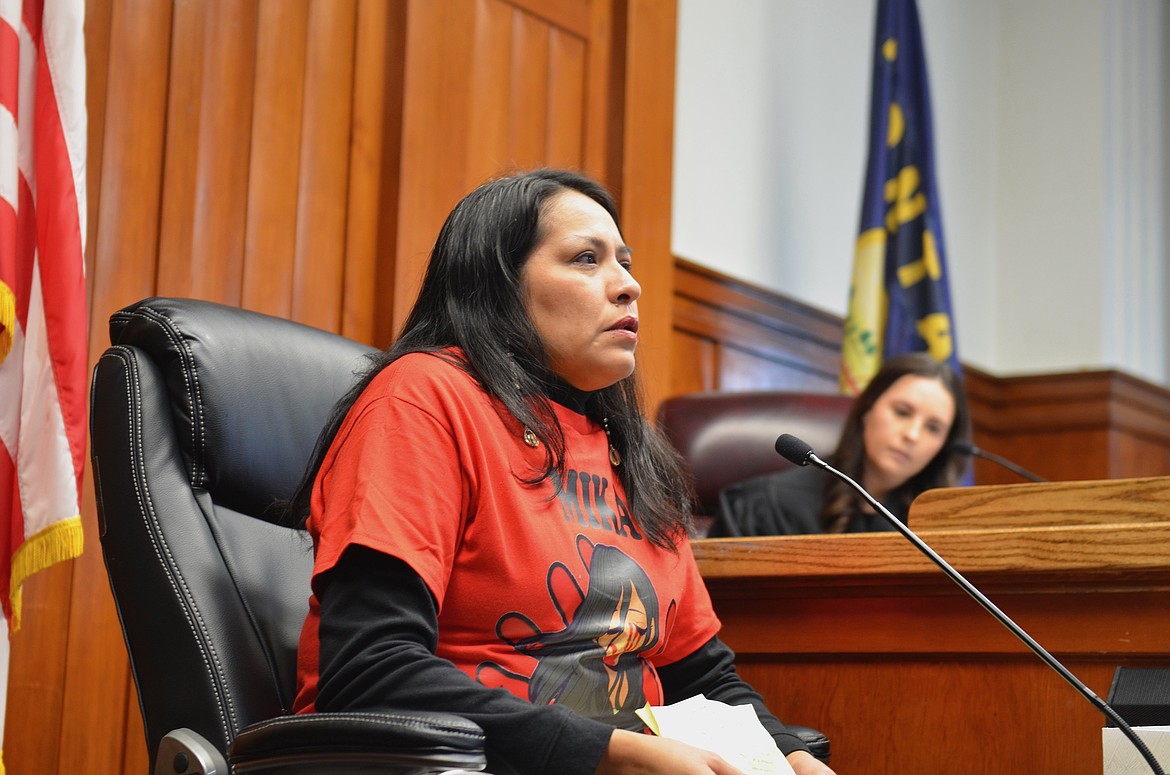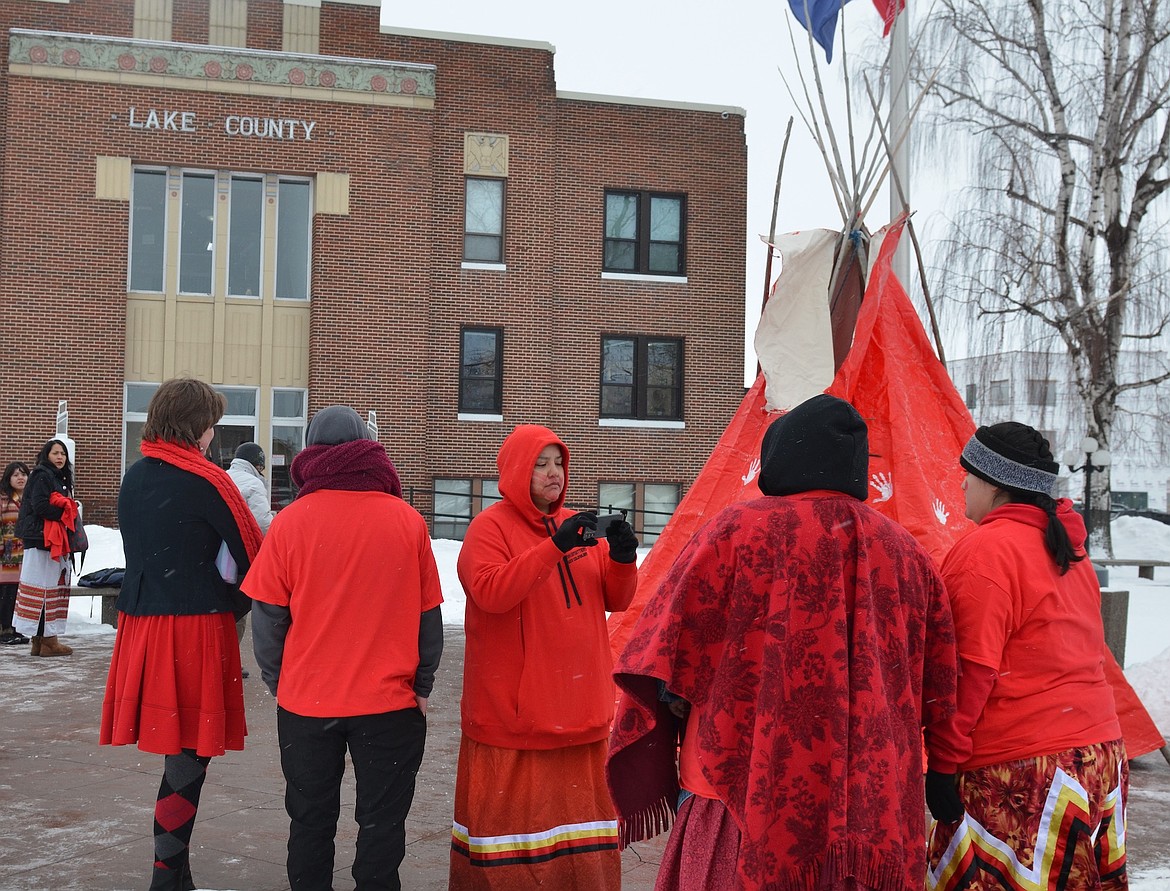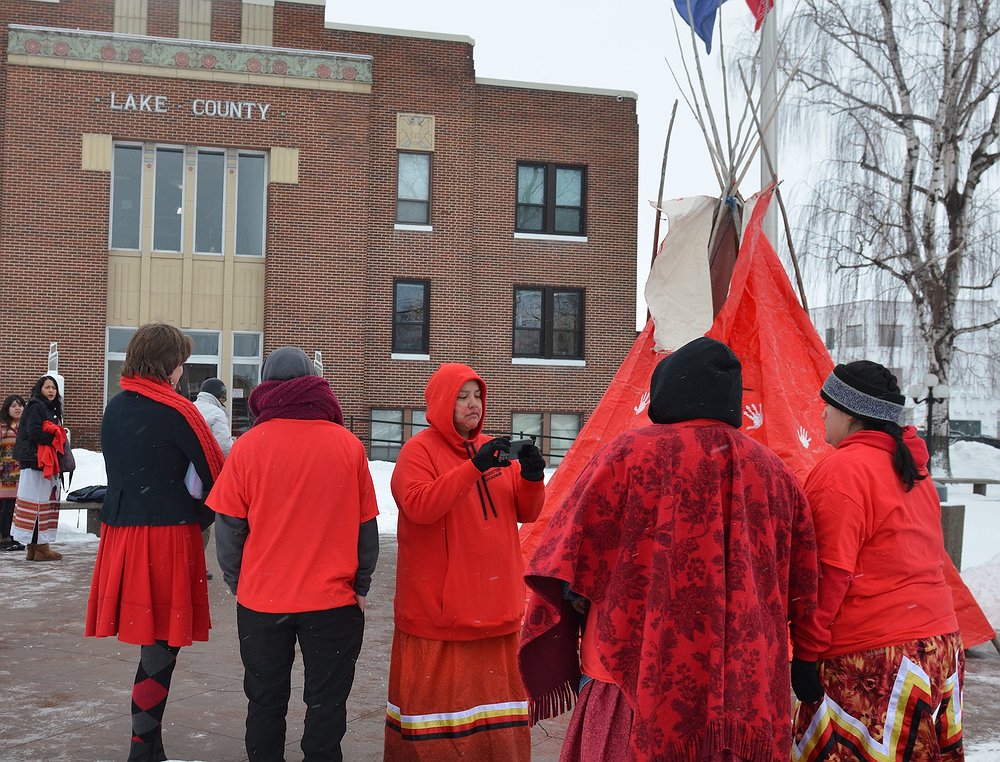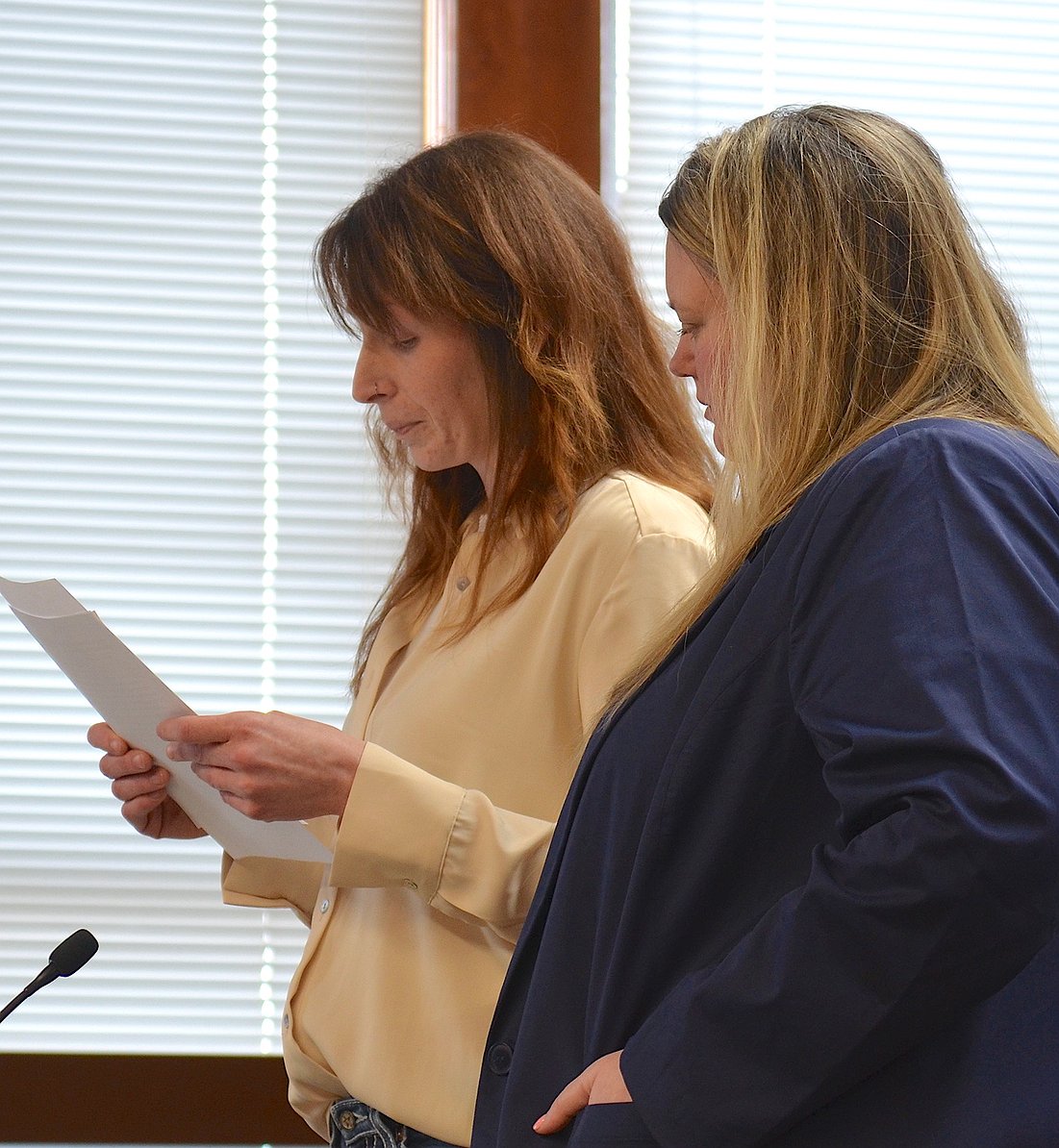Mika Matters: Hearing paints vivid portrait of Mika Westwolf
Pain, sorrow, fury, love and, in some cases, forgiveness, coursed through the courtroom at the Lake County Courthouse during last Friday’s sentencing hearing for Sunny White. As did a recurring plea for justice – not only for Mika Westwolf, but for other Native people who have been treated unfairly by the justice system.
A red tipi was positioned in front of the courthouse, and an overflowing crowd of supporters – many attired in red Mika Matters t-shirts – filled the third-floor courtroom and the conference room. Inside the courtroom, images of Mika flashed across a screen – depicting her hiking, laughing with her family, cradling a cat, attired in dance regalia, playing a ukulele – as members of the young woman’s family and close friends testified about their love, anger and sense of loss.
As they spoke for nearly three hours, White, the 28-year-old woman who hit Westwolf in the early morning hours of March 31, 2023, while driving north on Highway 93, awaited her sentence for vehicular homicide and leaving the scene of an accident.
That morning nearly two years ago, White was pregnant, high on a mix of fentanyl and methamphetamine, and had her two children, ages 2 and 4, in the back seat of the vehicle. She didn’t stop and claimed later that she believed she had hit a deer.
In October, she pled guilty to vehicular homicide while under the influence and accidents involving another person or a deceased person, both felonies. In exchange for the guilty plea, two counts of criminal child endangerment and one count of criminal possession of dangerous drugs were to be dismissed at sentencing.
At the conclusion of Friday’s hearing, District Court Judge Molly Owen sentenced White to 25 years in the Montana State Prison for vehicular homicide, with 15 of those suspended, and no opportunity for parole for a period of 10 years. She was also sentenced to five years, all suspended, for the second charge. It was the sentence recommended by Lake County Attorney James Lapotka and Assistant Attorney General Thorin Geist.
The defendant received credit for the seven days she has spent in jail. She was also ordered to pay restitution of $800 to Carissa HeavyRunner and $3,500 to the Blackfeet Nation.
“She will be forever 22 years old”
“I will never get to hold my daughter's hand as she gives birth to my grandbaby. I will never get to see her wedding day. Her father will never get to walk her down the aisle,” Mika’s mom, Carissa HeavyRunner, told Owen. “I will never get to see my daughter grow up. She will be forever 22 years old.”
“I didn't just lose my daughter once,” she added. “I will lose her every day for the rest of my life.”
“A precious limb has fallen from our family tree in the loss of our dearest Mika almost two years ago,” said her grandfather, George HeavyRunner Sr. “It can never be put back to grow with us and we will not be able to witness what was to be of the potential that she lived.”
He also criticized White for “so callously” leaving his granddaughter “alone on the roadside at mile marker 20 on Hwy. 93,” where her body was later discovered by a tribal police officer.
That was a sentiment returned to again and again by family members – the thought of their beloved daughter, granddaughter, niece, cousin, friend, left alone to die by the side of the road.
Also clouding the proceedings was the perception that Sunny White was affiliated with the Aryan Nation, based on the names of her older children and her husband’s affiliation with the white supremist group. He is currently in prison.
Each of Mika’s fathers – her birth father, Michael John Westwolf, and the dad who raised her, Kevin Howard – spoke of forgiveness.
Westwolf, appearing via Zoom, told White, “It takes a true warrior to forgive.”
“I want you to know that I forgive you,” he said, as she cried. “With all my heart, I pray to the Creator to do the same and show you that love is stronger than hate.”
Howard said a few days before she was killed, Mika had burst from her room and asked him if he would forgive someone if they murdered her. At first, he told her “no way.” Then he asked if she would want him to forgive. “Of course I would,” she replied.
Mika “was special like that,“ Howard said. “So I have no choice but to honor her wishes and forgive Mrs. White for her heinous acts.”
He spoke of other family members on the reservation who were murdered and did not receive justice, or who have received much harsher sentences than their white counterparts for the same crimes. He also spoke of other parents of hit-and-run victims who were “stonewalled … and basically intimidated to just back down and let things go” by investigators.
He expressed his frustration at how hard his family has had to fight for justice and how long it had taken. “We, as a family, were forced to investigate our own daughter's death. Instead of mourning her death, we were forced to go out on the street and ask for video surveillance. We were forced to interview people,” he said. “What kind of nonsense is that?”
“For that, I cannot forgive,” he said. “And until there’s a change that’s made, I hold Lake County and this court responsible.”
Others spoke of Mika’s lineage – she was a descendent of Blackfeet Chiefs White Calf and HeavyRunner – “so the English, they would look at her as a princess,” said her uncle, Arthur Thomas Westwolf Sr. He described her as fun and mischievous, a scholar and an athlete, “someone who brightened up the room wherever she went.” She was also kind and attentive to her elders.
Other women in her family live a long time, including her great-grandmother, who turns 101 next month. “These are women of leadership,” Westwolf said. “Who knows what she would have accomplished if she lived beyond her 22 years?”
Kim Paul, whose granddaughter, Maya, was born exactly a year after Mika, on Sept. 11, 2001, said the two girls “celebrated most of their birthdays together, and spent more days, weeks, months and years together than apart.”
“Mika's world revolved around her family and she was dedicated to them and they to her,” Paul said. “And very few families ever get to live this truth. And now, how are they supposed to go on?”
Mika had represented her family, tribe, the state of Montana and her nation at a United Nations forum, traveled to the Himalayas to dance and evoke her “strong, beautiful, 20,000-year-old culture,” and taught NASA camps for underprivileged children and teens.
“Mika wrote poetry and played the ukulele for heaven's sakes,” Paul said tearfully. “She didn't deserve to be murdered. She was happy, loving, and kind.”
White asks for mercy
Prior to Judge Owen imposing the sentence, the defense had an opportunity to ask for leniency, especially in light of White’s responsibility as the mother of three children traumatized by their parents’ abusive relationship. The youngest, at 15 months, was still breastfeeding,
Counselors and family members recounted her efforts over the past two years to pursue sobriety, learn parenting skills, and begin to understand and take some responsibility for her past. She had worked at a nursing home in Kalispell prior to her arrest in October 2023, helped out in her son’s Head Start classroom and volunteered with Habitat for Humanity.
White concluded that portion of the hearing with a tearful reading of a statement she had written, asking the judge, “to please show me mercy and allow me to receive a fair sentence without any parole restrictions and to be able to finish the job I started when I became a mother, raising my children to be successful, kind and compassionate adults.”
“To the family, friends, and loved ones of Mika Westwolf, I give my sincerest apologies for the horrid pain and suffering that I played a part in causing you all,” she said.
Judge Owen, while congratulating White on the positive steps she had taken to improve her life, appeared unmoved by the defendant’s plea for leniency. She noted that White would have faced a maximum penalty of 60 years in prison had she been charged with all five felonies instead of the two most severe counts of vehicular homicide and leaving the scene of an accident stipulated in the plea agreement.
Owen noted that while she personally agreed with many of the concerns voiced by Mika’s family regarding social justice, “the court is not a vehicle for advancing social concerns.” Earlier in the hearing, she apologized “on behalf of the state of Montana and the entire criminal justice system” for the nearly two years it’s taken to prosecute the case. “Sometimes these investigations and prosecutions take time.”
As to allegations made by family members that the crime was motivated by white supremist ideology, Owen said the state’s prosecutors had found “insufficient evidence to support a hate crime” conviction.
By focusing on White’s past, and whether or not she was fleeing from domestic abuse, “what we're truly doing is disparaging Mika and forgetting about her. She was a human and she was killed by the defendant's conscious disregard for the safety of others. The defendant should be punished for creating this situation … for killing her,” Owen said.
She also expressed her appreciation to the Westwolf and HeavyRunner families “for your tireless advocacy for Mika and for other MMIW (Missing and Murdered Indigenous Women). I hope that you find some comfort in knowing that your efforts will make a tangible difference.”
Carissa HeavyRunner vowed to continue that work of helping other parents of MMIW find their voices and pursue justice, and to forgive White, because “I cannot live the rest of my life and live for my daughter in hatred and fear.”
Still, sorrow haunts her. “No one talks about the second kind of grief, the quieter one that settles deep in your bones,” she said. “The grief for a future stolen. For a life I imagine but I will never live or experience. A life with my girl.”





